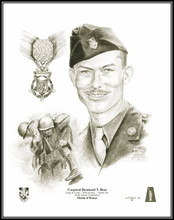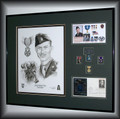 Loading... Please wait...
Loading... Please wait...- Home
- Lmtd/Opn Edtns ~ 40% Off~ Free Shipping
- Corporal Desmond T. Doss by L. Ortega ~ 40% Off ~ Free Shipping
Product Description
Print Size: 11" x 14" ~ Duo-Tone 225 print Limited Edition Signed & numbered by the Artist.
Comes with a COA.
Corporal Desmond T. Doss
During World War II, over 70,000 men were designated conscientious objectors, mostly men whose religious beliefs made them opposed to war. Some refused to serve, but 25,000 joined the US armed forces in noncombat roles such as medics and chaplains. Desmond T. Doss of Lynchburg, Virginia, was one of those men, though he personally shunned the title of conscientious objector.
Doss, born in 1919, was raised with a strong belief in the Bible and the Ten Commandments, attending a Seventh-day Adventist church. He held particularly strong views against killing and working on the sabbath, which as a Seventh-day Adventist, he observed on Saturday. When the United States entered the war, Doss was working at the Newport News Naval Shipyard. It would have been easy in 1942 for Doss to apply for a deferment, and many would have expected as much from someone who refused to bear arms against another. Doss, however, felt a calling to serve his country and to help his fellow man. When he was drafted in the spring of 1942, Doss did not refuse enlistment on the grounds of being a conscientious objector. In fact, he believed the war was just and desired to do his part, but for him that meant saving lives, not taking them, and thus Doss was known to describe himself as a “conscientious cooperator.”
In spite of his conscientious objector status, Doss was required to undergo the usual basic training. He was allowed to forgo weapons training, and even received a pass to attend church on his Saturday Sabbath. Although Doss was a willing participant and felt himself to have as great a sense of duty as any man in his unit, boot camp was not an easy time for him. He was verbally harassed, with warnings such as, “Doss, when we get into combat, I’ll make sure you don’t come back alive.” Boots and other items were sent flying his way as he prayed at night. Ostracized by his unit, and bullied by both enlisted men and his commanding officers, Doss held on to his faith and was an exemplary soldier.
Several attempts were made to remove the man they felt was a coward and a detriment to the unit. His commanding officers attempted to have him discharged for mental illness, but he refused to accept, stating he could not agree to a discharge due to his religion. Doss’ commanding officers eventually gave up, realizing that such a discharge would never be approved at higher levels. Another officer unsuccessfully attempted to have him court martialed for refusing to hold a rifle. Instead of a court martial, he denied Doss leave, nearly causing him to miss seeing his brother Harold, who had joined the US Navy.
In 1944, Doss shipped out, bound for the Pacific as a member of the medical detachment of the 307th Infantry Regiment, 77th Infantry Division. Although Doss would become known for his actions on Okinawa, the bloody battle there was not his first. The 77th landed in Guam in July 1944. The men who had threatened to kill Doss in boot camp quickly realized the value of their Bible-carrying medic. For his bravery in treating wounded men under fire during the fighting in Guam, Doss was awarded a Bronze Star for valor. After Guam, the 307th fought at Leyte. Again, Doss showed his dedication to his comrades and bravery in combat and was awarded a second Bronze Star.
The escarpment where the men were fighting was a cliff roughly 400 feet high. The top 35 feet created an overhang, where the cargo nets had been necessary for the men to reach the top. For days, men of the 307th held out, fighting against heavily entrenched Japanese forces. Japanese machine-gun fire was so intense one GI was decapitated. Unarmed, Doss treated the wounded under enemy fire. He had removed any markings indicating he was medic, as Japanese forces knew taking out one medic could result in the loss of more GIs who would have no one to help them. Over the next several days, Doss continually put himself in mortal danger to aid his fallen comrades. Unafraid to rush into harm’s way, he worked to save the very men who had once threatened his own life.
On May 21, Doss was wounded several times by grenade fragments and a sniper’s bullet through his arm. He continued to put others first, refusing treatment before those more seriously wounded. Due to his extensive wounds, Doss was evacuated in late May. He returned home, but spent years recovering from his wounds and from tuberculosis, which he had caught in Leyte.
On October 12, 1945, President Harry S. Truman presented Doss with the Medal of Honor in a ceremony on the White House lawn. Truman shook Doss’s hand and told him, “I’m proud of you. You really deserve this. I consider this a greater honor than being president.” Doss was the first--and only--conscientious objector to receive the Medal of Honor during World War II. Of the honor Doss said, “I feel that I received the Congressional Medal of Honor because I kept the Golden Rule that we read in Matthew 7:12. ‘All things whatsoever ye would that men should do to you, do ye even so to them.’"
MEDAL OF HONOR CITATION
“He was a company aidman when the 1st Battalion assaulted a jagged escarpment 400 feet high. As our troops gained the summit, a heavy concentration of artillery, mortar, and machine-gun fire crashed into them, inflicting approximately 75 casualties and driving the others back. Pfc. Doss refused to seek cover and remained in the fire-swept area with the many stricken, carrying them one by one to the edge of the escarpment and there lowering them on a rope-supported litter down the face of a cliff to friendly hands. On 2 May, he exposed himself to heavy rifle and mortar fire in rescuing a wounded man 200 yards forward of the lines on the same escarpment; and two days later he treated four men who had been cut down while assaulting a strongly defended cave, advancing through a shower of grenades to within eight yards of enemy forces in a cave's mouth, where he dressed his comrades' wounds before making four separate trips under fire to evacuate them to safety. On 5 May, he unhesitatingly braved enemy shelling and small-arms fire to assist an artillery officer. He applied bandages, moved his patient to a spot that offered protection from small-arms fire, and, while artillery and mortar shells fell close by, painstakingly administered plasma. Later that day, when an American was severely wounded by fire from a cave, Pfc. Doss crawled to him where he had fallen 25 feet from the enemy position, rendered aid, and carried him 100 yards to safety while continually exposed to enemy fire.
On 21 May, in a night attack on high ground near Shuri, he remained in exposed territory while the rest of his company took cover, fearlessly risking the chance that he would be mistaken for an infiltrating Japanese and giving aid to the injured until he was himself seriously wounded in the legs by the explosion of a grenade. Rather than call another aidman from cover, he cared for his own injuries and waited five hours before litter bearers reached him and started carrying him to cover. The trio was caught in an enemy tank attack and Pfc. Doss, seeing a more critically wounded man nearby, crawled off the litter and directed the bearers to give their first attention to the other man. Awaiting the litter bearers' return, he was again struck, this time suffering a compound fracture of one arm. With magnificent fortitude he bound a rifle stock to his shattered arm as a splint and then crawled 300 yards over rough terrain to the aid station. Through his outstanding bravery and unflinching determination in the face of desperately dangerous conditions Pfc. Doss saved the lives of many soldiers. His name became a symbol throughout the 77th Infantry Division for outstanding gallantry far above and beyond the call of duty.”













